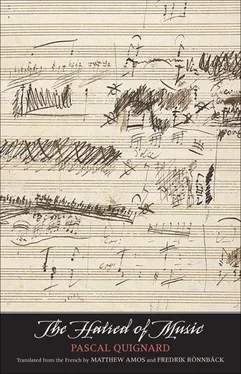Vestiges predict the weather, foretell the future.
Certain sounds, certain hums tell what “past” is presently within us. 3

Sei Shōnagon in the year one thousand, in the empress’s palace, in Kyoto, on multiple occasions, in the diary that she rolled up and stuffed inside her wooden pillow as she lay down on her bed, noted down the noises that moved her. The sounds on which she dwelled the most frequently, seemingly without ever having grasped their full meaning, or understood their reasons, because of the solitude and celibacy suffocating her, and which every time brought her the feeling of joy (or the nostalgia for joy, or perhaps the present appealing illusion that characterizes the nostalgia for joy), consisted in the noise of wagons on the dry road, in the summer, at the end of the day, when shadow encroaches on all the visible land of the earth.

Empress Sadako’s confidante added:
Hearing behind the partition the sound of chopsticks clicking.
Hearing the noise that the handle of the rice wine jar makes as it falls back down.
The faint noise of voices through a partition.

Music is primordially linked to the theme of the “acoustic partition.” The earliest tales make use of this theme of pricking one’s ears, of overhearing confidences, behind the curtain, in the castles of Denmark, behind the wall, in Rome or Lydia, behind the palisade, in Egypt. It is possible that listening to music consists less in distracting the mind from “acoustic suffering” than in struggling to reestablish animal alert. What characterizes harmony is that it resuscitates the acoustic curiosity that is lost as soon as articulated and semantic language spreads within us.

Apronenia Avitia, in Rome, in the early years of the fifth century, in the letter that begins with the words Paene evenerat ut tecum …, briefly mentions the “enthralling noise of the dice cup” that affects her violently. Then she moves on to something else. There are noises that have “enthralled” themselves in each of us. Although she belonged to the pagan party, she was related through the bonds of gens and patronage to Proba (the Christian patrician who opened the gates of Rome to Alaric’s Gothic armies) and to Paula (Saint Paula). A painting by Claude Lorrain kept in the Prado museum, entitled Embarkation of Saint Paula Romana at Ostia , allows us to imagine Apronenia’s silhouette, beside that of Eustochia, in 385, accompanying Saint Paula to the sea.
The sea is calm. The light spills out of the space of the sky; it tears apart the forms on which it settles by amplifying them. All is silence before the island where the Sirens lie in wait.
The Sirens are Apronenia, Eustochia, Saint Paula.

In all favorite music there is some ancient sound added to the music itself. A mousikè in the Greek sense is added to the music itself. A sort of “added music” that makes the ground fall away, that immediately takes aim at the cries from which we suffered without our being able to name them, when we could not even see their source. Nonvisual sounds, forever withdrawn from sight, roam within us. Ancient sounds tormented us. We did not yet see. We did not yet breathe. We did not yet scream. We heard.

In the rarest moments, music could be defined: something less acoustic than the acoustic. Something that binds noise. (In other words: a piece of tied-up sound. A piece of sound whose nostalgia intends to remain in the intelligible. Or this simpler monstrum: a piece of semantic sound devoid of meaning.)

What constitutes the pavor , the terror , in memories is that childhood is irreparable and that the irreparable part was its amplifying, vigorous, and constructive part. We can only stir up these sediments that are “semantic without meaning,” these asemic semes. We can only make them howl like when we pick at wounds to examine their state. Like when we rip rotting and infecting threads from the pink lips of wounds.
The scar of childhood, like the one that preceded it and that opens up in nocturnal sound, will be a flat electroencephalogram.

Horace never wrote a single line about his memories of his mother. From Varius, from Messalla, from Maecenas, from Virgil, we know how difficult it was for him to speak. His delivery was fragmented; he butchered the cases. In the Epistle to the Pisos , he wrote:
Segnius irritant animos demissa per aures
Quam quae sunt oculis subjecta fidelibus .
Father Sanadon chose to translate these two verses in the style of a measured and somber maxim:
Ce qui ne frappe que les oreilles fait moins d’impression que ce qui frappe les yeux.
4
Theophrastus asserted on the contrary that the sense that opens most widely the door to passion is acoustical perception. He said that sight, touch, smell, and taste subject the soul to a less violent distress than that caused, through the ears, by “thunder and moans.”
Visible scenes stupefy me and expose me to silence which itself is a song by privation. I have suffered from mutism: a deprived song. A dance: one sways back and forth. Or one’s head turns from one ear to the other. Silence is rhythmic.
But most piercing screams, certain crashes overwhelm me beyond measure, to the point of arrhythmia.
Sounds plunge us into a silence of hearing more torn asunder than the silence of sight which Horace claims however to be the first esthetic tearer.

Music alone tears asunder.

Horace also affirms that silence cannot divide itself entirely. Acoustic annihilation cannot reach the end of its division: complete silence. Horace says that even at noon, even at the moment of greatest torpor, in summer, silence “buzzes” on the stagnant riverbanks.

Our familiarity with light, our familiarity with atmospheric air — these are as old as we are. In our societies, our age is counted not from the moment of conception, but from birth, in the familial, symbolic, linguistic, social, historical order.
Our familiarity with an acoustic world without the capacity for expression in return, without the capacity for apprehension or for verbal reaction, and even the ear of the language into which we will be born, these precede us by several months.
By two to three seasons.
The Acousticals predate our birth. They predate our age. These sounds even predate the sound of the name that we do not yet bear and that we never bear until well after it has resounded around our absence in the air and in the day that do not yet include our face and that are oblivious to our sex.

Mousikè and pavor .
The pavor nocturnus . Noises, gnawing of field mice, of ants, water dripping from the faucet or from the gutter, breathing in the shadows, mysterious wails, muffled screams, silence that suddenly does not meet the norm of the sound of silence of that place, alarm clock, branches lashing or rain pattering against the roof, cock.
Читать дальше













